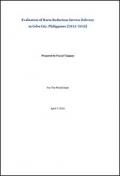Publications - Released in 2016
The Philippines has been identified as one of nine countries in the world where HIV continues to increase at an alarming rate of more than 25 percent. HIV transmission among people who inject drugs (PWID) expanded rapidly in recent years, from less than 1 percent in 2005 to more than 5 percent in the past five years. There are between 12,304 and 16,607 PWID living in the Philippines, with the majority—an estimated 6,000 PWID—in Metro Cebu and between 2,000 and 2,500 in Cebu City. HIV and Hepatitis C Virus (HCV) rates among this group have been estimated at 41.6 percent and 70 percent, respectively. In Cebu City, up to 74 percent of people living with HIV contracted the virus through needle sharing, and 99 percent of infections among PWID were reported in Metro Cebu.
In March 2013, Population Services International (PSI) was contracted to lead the implementation of the Big Cities Project (BCP) between April 15, 2013 and December 31, 2015 with a total budget of US$1,840,000 committed by the World Bank and the Asian Development Bank (ADB). The ultimate goal of the project was to reduce HIV transmission by reducing risk behaviors among PWID. Specifically, implementation of the BCP aimed to develop friendly drop-in center (DIC) and outreach services; increase demand and uptake of health services through improved peer education and support; and strengthen governance for development and implementation of sustainable, evidencebased policies and interventions.






